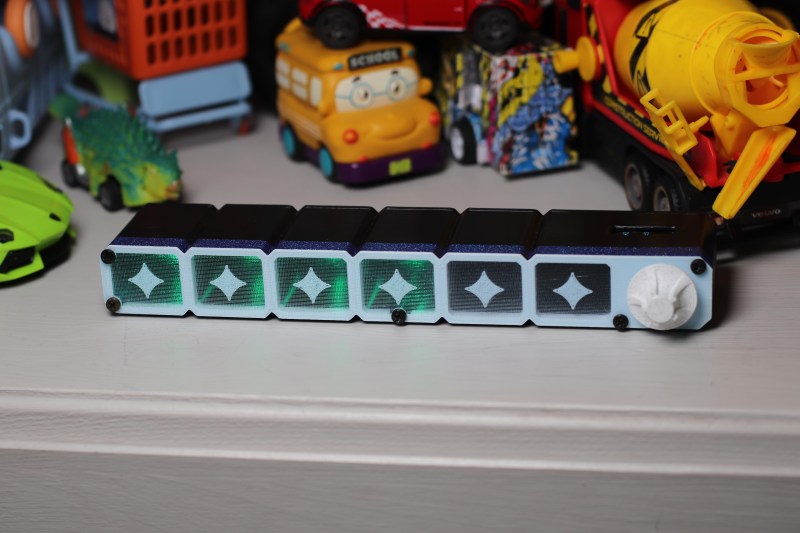It’s really never too early (or too late) to learn time management. All joking aside, carefully managing one’s time can result in some really wondrous achievements. So it’s best to learn early, when most of your time is spent generally having fun.
Let’s say you’ve just heard you have five minutes left to play, but what does that mean if you’re three years old? Not much, unless you have some visual cues to go by. That’s the idea behind [Julius Curt]’s visual timer for toddlers.
This lovely reverse progress bar uses a Wemos D1 mini to control a strip of six WS2812B LEDs at 30 LEDs/meter density. There’s a small OLED display for literate users, and the whole thing is childproof. [Julius] challenged himself to do this entire project in one day, and ended up finishing it in a little over eight hours total, including time to design the way cool knob. Be sure to check out the build video below.
If you struggle with managing your time, check out our own [Arya Voronova]’s personal account.
















when my daughter were toddlers I would tell them “X cartoon{s)” or “Y movie(s)” to define lengths of time.
When we took roadtrips I would tell her a trip was “X fingers long” and whenever we had driven an appropriate distance I would hold up my hand and say “ONE finger down”
Putting things into a perspective she could understand removed a lot of “are we there yet?” “how much longer?” etc
Interesting! I wonder how “5 fingers long” would have worked with my daughter waay back when.
that is how I measure my whiskey now that I have kids.
5 fingers at a time.
LOL!
Pendleton, I ask?
Genuinely curius, in what way exactly is this thing childproof?
The project says “The idea was to create a countdown timer with a simple, child-proof interface.”
So I think they are talking about ease of use for a child and not about safety.
Like the minute hand of a clock?
The problem is that small children still don’t necessarily understand the passage of time, or how long each “unit” is, because they’re not paying attention to the passage of time. It’s very subjective. Five minutes, five seconds, it’s always the same cry at the end when you have to stop playing.
Also, the concept of amounts and numbers for small children is vastly different from the adults: try holding up five fingers with one hand, then three in one hand and two in the other, and ask which amount is greater – or even whether they’re any different. When you realize that children don’t necessarily even understand the concept of “five” the same as you do, you’ll notice how futile it is to demand them to wait for “five minutes”.
Also see: “Why do small children cry? Because the wi-fi router stopped blinking.”
Sometimes it seems like being a child is tantamount to being on LSD.
The cool part is that if you pay attention you can see the progression from what you describe to actually developing those concepts. It’s really cool to watch a human brain develop in front of you. As adults it’s super rare to witness- the moment when someone actually “gets it.”
Another fun thing to try: “Do you want cake or ice cream?”
The answer will most likely be “yes”.
Some say small children understand OR literally as non-exclusive but I think they just don’t consider it a matter of choice. They hear cake and ice cream, and forget the rest.
There are absolutely times when it is too early to be playing manager to your children and teaching them to punch a clock
Nonsense, citizen. These new worker-units should start training at the earliest opportunity.